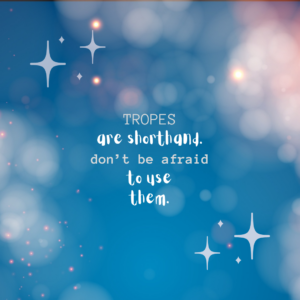How to Use Tropes in Middle Grade Fiction
In literature, a trope is a device, a theme, a motif or symbol that appears regularly in literary genres.
Some people call them cliches because they appear so often.
But that word has a negative connotation, so I don’t want to use it.
A trope can be a useful building block for a story.
It’s shorthand and doesn’t require a lot of explanation.
Every genre has its tropes.
Middle Grade does, too.
Don’t be afraid to use them.

Published authors use them because they work.
Here are a few Middle Grade tropes.
See if you recognize them.
The orphan: Middle Grade has plenty of orphans, characters who have no family or none that cares about them.
Alternatively, an MG character might have a widowed mother or widower father, or they might live with a grandparent.
Or their whole family may be missing.
Why it’s used: Orphans build immediate sympathy or empathy with the reader.
Being an orphan allows the main character more freedom to act than they would have if they had parents.
Also, if the family or a loved one is missing, it can create a ready-made plot where the main character sets out on a journey to find them.
The middle child or the overlooked child: This character feels undervalued and invisible.
Why it’s used: This character isn’t necessarily immediately likeable, although they can be.
But the reader feels for them and knows that the character is going to do something over-the-top or dangerous or unbelievable to gain attention.
The overlooked child also has more freedom and more opportunities to act because they’re under the radar—no one is paying attention to them.
The Weakling: This is a character who doesn’t feel as if they have any agency over the direction of their life.
Why it’s used: It provides the character arc—the weakling who never speaks up/or takes action on their own or someone else’s behalf, finds their voice/strength/capabilities.
Brainiac: A character who is as smart as or even smarter than adults.
Why it’s used: This smart character is able to solve a tricky problem without adult involvement
Wise elder: Generally an elder who can provide wisdom.
Why it’s used: These characters provide wisdom and offer guardrails and guidance but are too feeble in some way to otherwise provide much assistance in solving the problem.
Bullies/Bullying: This is becoming less of a theme and more of a background situation. It used to be that bullies were unusual. Now, sadly, they’re commonplace, but still useful in stories.
Why it’s used: It gives the main character someone physical to rail against.
Unfortunately, most kids today know a bully or what bullying behavior is so they understand the dynamic.
Good versus bad.
Belonging: This is a theme that is used often enough in middle grade to be considered a trope.
It requires a main character who feels alone and is seeking a person or a group to belong to.
Why it’s used: Many readers of middle grade books can feel ostracized or like they don’t belong anywhere.
Providing them a storyline of belonging is validating.
The opportunities for plot using this theme are endless.
Magic talisman: This is akin to a rabbit’s foot or a special piece of jewelry or a shiny rock.

It can be anything.
Why it’s used: Kids love the idea of a special something that is imbued with magical or spiritual powers that can help them solve their problems.
Letters: This is generally a letter from a dead parent or other relative who was important to the main character.
It can also be a letter from an important historical figure.
Why it’s used: Letters can increase the stakes by providing a mystery, or they can provide answers when the person who wrote the letter isn’t around to assist the main character in any other way.
Try using some tropes and see if it helps your creativity.
Quick tip: If you’re writing a crutch character (for example, a wise elder) or using a crutch item (such as a rabbit’s foot), remember that your main character must be the one who ultimately solves their problem.
Another tip: Do not let your character wake up and realize it was all a dream and they never even had a problem.
Waking from a dream can be a trope, but not one that you want to use.
Enjoy your week.
~ Gail
(Tick tock)
Before you go, don’t forget to sign up for my mailing list, below:


Sometimes I feel like this whole life is a dream. Spirit’s trope. 🙂
Wouldn’t that be something if we could all wake up and realize it was all a dream–or a nightmare, as the case may be. No more earthquakes, tornadoes, plane crashes, war, evil. What would we do then? What can we do now? Sometimes I feel as if I have no agency, like a badly written MG character. Ha ha. (?!)